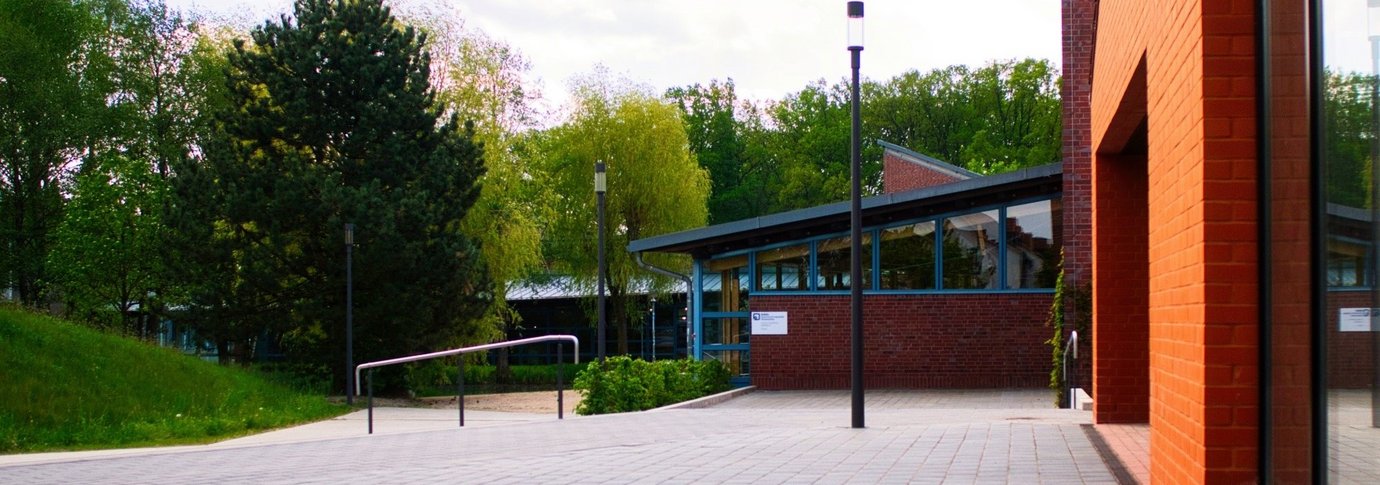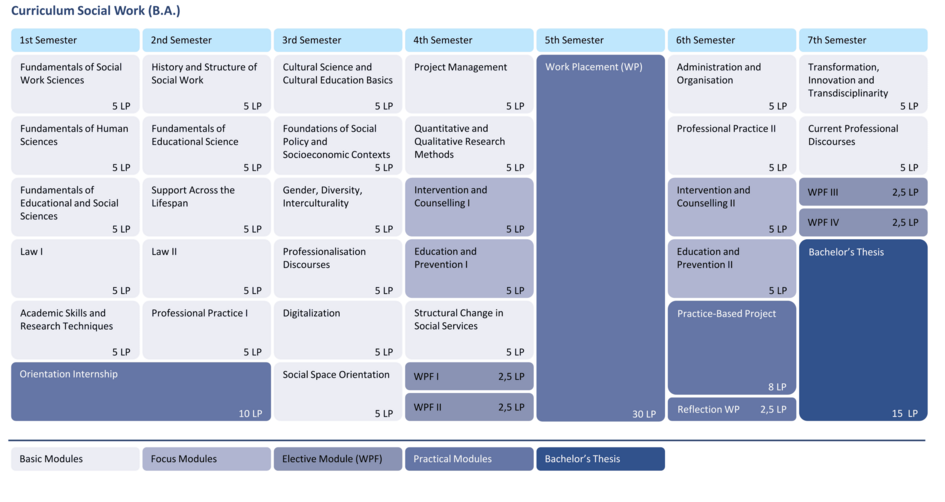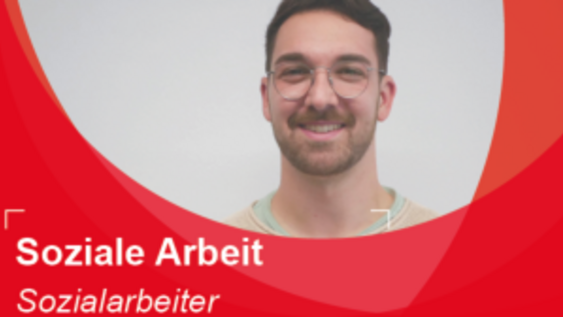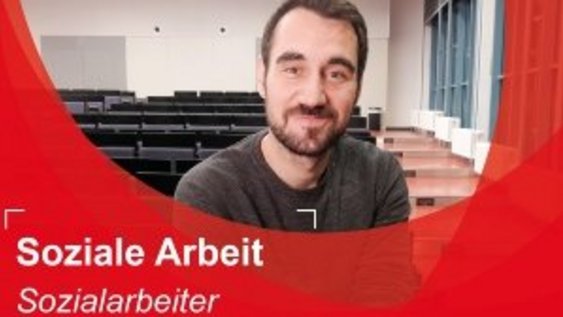Social Work
Would you like to work with people, strengthen the community and help shape a sustainable society?
By studying social work with us in Suderburg, you can play an active role in shaping a more socially just society. Building on legal, pedagogical and psychological foundations, we provide you with a comprehensive specialised knowledge of the theories, concepts and methods of social work.
After 7 semesters of standard study time, you will have a Bachelor's degree and state recognition as a social worker. The advantage of our single-phase Bachelor's programme? The practical components for state recognition are integrated into the degree programme. You can start the job of your choice straight after graduating. Our degree also gives you direct access to further qualifying Master's programmes.
Facts at a glance
Think globally. Study locally.
Best opportunities. Choose social work at the Suderburg campus!
To the applicationDetails of the degree programme
Fields of activity
Fields of activity
With a degree in Social Work at the Ostfalia Campus in Suderburg, you will have access to numerous exciting fields of work in which you can actively improve people's lives and help shape social change:
- Community education work
- School social work
- Work with people with disabilities
- Family counselling
- Addiction counselling
- Migration and integration work
- Street work
- Work in public service offices (e.g. youth welfare office, social welfare office)
- Work in clinics and social psychiatric services
- Child and youth welfare
You can find out more about what our graduates do after completing their studies further down on this page: Career prospects
Programme content
Programme content
At the Suderburg campus, you will study social work in a practical and academic way. You will develop important skills for working professionally with people and solving problems later on. Theory and practice go hand in hand here.
For example, you will learn
- How to advise and support people
- The most important laws and ethical rules
- Methods for analysing social situations
- How to reflect on and improve your own actions
Interesting opportunities to deepen your professional knowledge, which are in high demand not only in our rural region, but also in urban centres:
- "Intervention and counselling" opens up paths into counselling and care for people with mental illnesses, disabilities, addiction problems or the care of people who have been traumatised by violence or abuse.
- "Education and prevention" opens up paths into early childhood education, child and youth welfare, family support and social work in schools and further education.
Practical learning
Practical learning
When studying Social Work in Suderburg, you will experience practical learning right from the start. You will not only gain practical experience in the orientation internship and in the practical phase, but also throughout the course of your studies through projects, case work and close cooperation with practice partners. This allows you to combine theory and practice directly and prepares you optimally for everyday working life. When you graduate, you will receive state recognition and be ready to start your career and directly support your fellow human beings.
Study programme
Basic and in-depth study programme with all the important modules of social work.
Integrated orientation internship to familiarise students with career opportunities, followed by a practical phase, which can be used to obtain state recognition.
- 1.1st and 2nd semesters: Fundamentals and orientation internship
- 3.to 6th semester: specialisation studies, practical phase, practical project and other compulsory elective modules
- 7. 2nd semester: Current specialist discourses, compulsory elective modules and Bachelor's thesis
1. Semester
Fundamentals of Social Work Sciences (1. Semester) Teaching of fundamental aspects of social work science, including a central introduction to the discipline and profession, definition of the subject of social work, discussion of methods in social work and fields of action in social work.
Teaching of fundamental aspects of social work science, including a central introduction to the discipline and profession, definition of the subject of social work, discussion of methods in social work and fields of action in social work.
Fundamentals of Human Sciences (1. Semester) Descriptions and explanations of human behaviour and experience in a social context are taught within the general framework of a bio-psycho-social model of human development. The focus is on teaching basic (social) psychological concepts (learning, thinking/problem solving, motivation, emotion, personality, attitude, communication/interaction) that are relevant to the planning and implementation of social work tasks. Students acquire the basics for understanding and modifying human communication and behavioural structures for different fields of action and activities in social work.
Descriptions and explanations of human behaviour and experience in a social context are taught within the general framework of a bio-psycho-social model of human development. The focus is on teaching basic (social) psychological concepts (learning, thinking/problem solving, motivation, emotion, personality, attitude, communication/interaction) that are relevant to the planning and implementation of social work tasks. Students acquire the basics for understanding and modifying human communication and behavioural structures for different fields of action and activities in social work.
Fundamentals of Educational and Social Sciences (1. Semester) The module offers an introductory approach to the basic concepts and findings of the disciplines of sociology and educational science. These provide reference knowledge and forms of knowledge acquisition for scientifically systematised social work. The module provides systematic knowledge to explain and understand social processes and structures, the social security system of exclusion risks and the identification and evaluation of professional help. This includes the following teaching content:
- Basic knowledge and fundamental knowledge of disciplinary educational science and sociological basic questions, methods of cognition and results.
- Basic concepts from educational and social sciences (including socialisation, upbringing, learning, education, social action, norms, values, social meaning, society, power, social inequality, normality, normalisation, exclusion-inclusion, life course, life situation, etc.)
- Fundamentals - areas, fields and functions of the education system in its historical-structural-genetic dynamics. Demarcations and structural links between the education system and the social welfare system as functional systems of society. First systematisations of functions and analyses of professional self-conceptions of social, school, special and cultural education, vocational education and adult education in their differences.
- Basic questions of the problematisation of different conceptual self-assurance and functional approaches in relation to current fields of action in social work.
- Familiarisation with sociology and educational science with their theoretical and methodological approaches as a means of observation and reflection for social work.
- Familiarisation with the sociological and educational science inventory of terms for observing social function and interaction systems and key pedagogical problems.
- Familiarisation with the social sciences as empirical sciences through exemplary initial empirical and theoretical research, investigation and reflection exercises.
The module offers an introductory approach to the basic concepts and findings of the disciplines of sociology and educational science. These provide reference knowledge and forms of knowledge acquisition for scientifically systematised social work. The module provides systematic knowledge to explain and understand social processes and structures, the social security system of exclusion risks and the identification and evaluation of professional help. This includes the following teaching content:
- Basic knowledge and fundamental knowledge of disciplinary educational science and sociological basic questions, methods of cognition and results.
- Basic concepts from educational and social sciences (including socialisation, upbringing, learning, education, social action, norms, values, social meaning, society, power, social inequality, normality, normalisation, exclusion-inclusion, life course, life situation, etc.)
- Fundamentals - areas, fields and functions of the education system in its historical-structural-genetic dynamics. Demarcations and structural links between the education system and the social welfare system as functional systems of society. First systematisations of functions and analyses of professional self-conceptions of social, school, special and cultural education, vocational education and adult education in their differences.
- Basic questions of the problematisation of different conceptual self-assurance and functional approaches in relation to current fields of action in social work.
- Familiarisation with sociology and educational science with their theoretical and methodological approaches as a means of observation and reflection for social work.
- Familiarisation with the sociological and educational science inventory of terms for observing social function and interaction systems and key pedagogical problems.
- Familiarisation with the social sciences as empirical sciences through exemplary initial empirical and theoretical research, investigation and reflection exercises.
Law I (1. Semester) The ability of social workers to act requires knowledge of the legal framework across all fields of action. Students acquire basic knowledge in the areas of law relevant to the theory and practice of social work. They learn to recognise the structural framework of social work and to assess the significance of law and legislation in the conception of professional assistance. This includes the following teaching content:
- Legal methodology: legal structuring options, hierarchy of legal sources, application of laws and legal case processing.
- Social constitutional law: Basic Law and social work (in particular human dignity), democratic principle, rule of law principle, welfare state principle.
- Social administrative law: interpretation and application of undefined legal concepts, exercise of discretion, basics of social administrative procedures (in particular rights and obligations of the parties involved in administrative procedures, enactment and cancellation of administrative acts).
- Social and welfare law: structure, logic and fundamentals of social law, overview of social insurance, basic income support for jobseekers (legal requirements, citizen's allowance, sanctions), social assistance (types of assistance, their requirements and amount).
The ability of social workers to act requires knowledge of the legal framework across all fields of action. Students acquire basic knowledge in the areas of law relevant to the theory and practice of social work. They learn to recognise the structural framework of social work and to assess the significance of law and legislation in the conception of professional assistance. This includes the following teaching content:
- Legal methodology: legal structuring options, hierarchy of legal sources, application of laws and legal case processing.
- Social constitutional law: Basic Law and social work (in particular human dignity), democratic principle, rule of law principle, welfare state principle.
- Social administrative law: interpretation and application of undefined legal concepts, exercise of discretion, basics of social administrative procedures (in particular rights and obligations of the parties involved in administrative procedures, enactment and cancellation of administrative acts).
- Social and welfare law: structure, logic and fundamentals of social law, overview of social insurance, basic income support for jobseekers (legal requirements, citizen's allowance, sanctions), social assistance (types of assistance, their requirements and amount).
Academic Skills and Research Techniques (1. Semester) Competence assessment alpha levels, catalogues, bibliographies, research techniques, tools and strategies (truncation, masking, thesaurus etc.), basic reading techniques (excerpts, summaries, summaries).
Competence assessment alpha levels, catalogues, bibliographies, research techniques, tools and strategies (truncation, masking, thesaurus etc.), basic reading techniques (excerpts, summaries, summaries).
Orientation Internship (1. Semester) Practical activity for orientation in exemplary fields of action in social work as well as practice transfer and reflection on the theory-practice link.
Practical activity for orientation in exemplary fields of action in social work as well as practice transfer and reflection on the theory-practice link.
Career prospects
Let our graduates take you directly into their everyday working life - in short videos they show how they apply their knowledge from their social work studies in Suderburg, whether in outpatient youth welfare, offender support, school social work or networking.
Location advantages Campus Suderburg
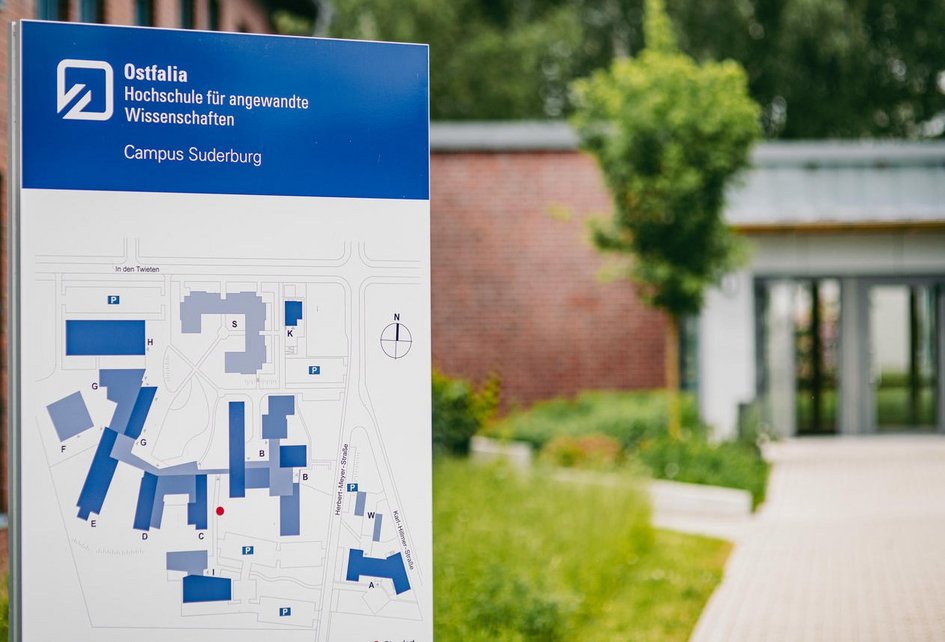
+ Modern equipment
+ Small groups
+ Intensive support
+ Familiar contact
+ Short distances
+ Active student life with parties, cinema, sports
+ Favourable living space
+ Lots of nature
+ Quickly in Hamburg or Hanover with the semester ticket and the train
Useful links and files
Do you still have questions?
Our Central Student Advisory Service (ZSB) will be happy to support you!
Building Am Exer 45, Room 101 -105
availability by phone:
Monday, Tuesday and Wednesday: 9:00 AM - 3:30 PM
Thursday: 1:00 PM - 3:30 PM
Friday and before holidays: 9:00 AM - 12:00 PM

